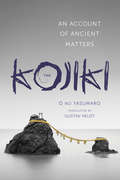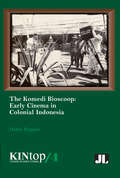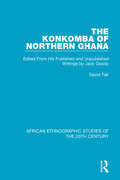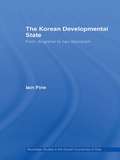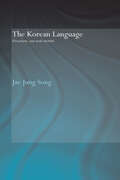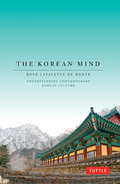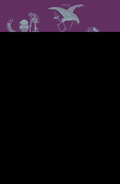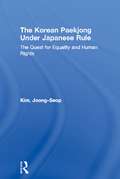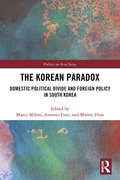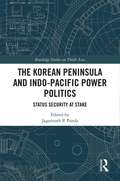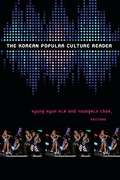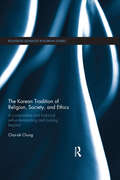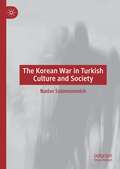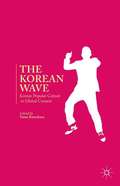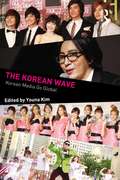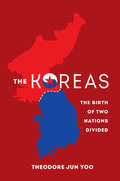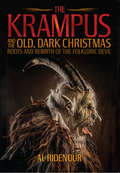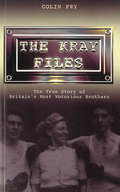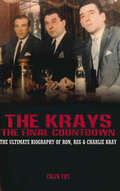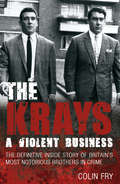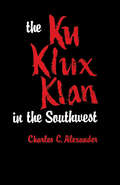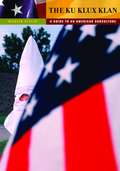- Table View
- List View
The Kojiki: An Account of Ancient Matters (Translations from the Asian Classics)
by No Yasumaro ŌJapan's oldest surviving narrative, the eighth-century Kojiki, chronicles the mythical origins of its islands and their ruling dynasty through a diverse array of genealogies, tales, and songs that have helped to shape the modern nation's views of its ancient past. Gustav Heldt's engaging new translation of this revered classic aims to make the Kojiki accessible to contemporary readers while staying true to the distinctively dramatic and evocative appeal of the original's language. It conveys the rhythms that structure the Kojiki's animated style of storytelling and translates the names of its many people and places to clarify their significance within the narrative. An introduction, glossaries, maps, and bibliographies offer a wealth of additional information about Japan's earliest extant record of its history, literature, and religion.
The Komedi Bioscoop: Early Cinema in Colonial Indonesia (KINtop #4)
by Dafna RuppinThis fascinating study of early cinema in the Netherlands Indies explores the influences of new media technology on colonial society.The Komedi Bioscoop traces the emergence of a local culture of movie-going in the Netherlands Indies (present-day Indonesia) from 1896 until 1914. It outlines the introduction of the new technology by independent touring exhibitors, the constitution of a market for moving picture shows, the embedding of moving picture exhibitions within the local popular entertainment scene, and the Dutch colonial authorities’ efforts to control film consumption and distribution.Dafna Ruppin focuses on the cinema as a social institution in which technology, race, and colonialism converged. In her illuminating study, moving picture venues in the Indies—ranging from canvas or bamboo tents to cinema palaces of brick and stone—are perceived as liminal spaces in which daily interactions across boundaries could occur within colonial Indonesia’s multi-ethnic and increasingly polarized colonial society.
The Konkomba of Northern Ghana: Edited From His Published and Unpublished Writings by Jack Goody
by David TaitOriginally published in 1964 this book made available for the first time David Tait's writings on the Konkomba with whom he lived and worked for 5 years. Including some previously unpublished material, this volume discusses the political system of the Konkomba but includes aspects of social and religious life.
The Korean Developmental State: From dirigisme to neo-liberalism (Routledge Studies in the Growth Economies of Asia #Vol. 73)
by Iain PirieThe Korean Developmental State is a comprehensive and up-to-date analysis of processes of state and economic restructuring in South Korea since the 1997 crisis. The book distinguishes itself from previous studies by consistently arguing that structural changes in the global political economy have played a crucial role in reshaping the Korean state’s own economic project. More precisely, Iain Pirie seeks to demonstrate how the Korean state increasingly adopted neo-liberal policies from the 1980s onwards as a rational response to the evolution of global economic structures; an evolution which has been driven by the continuous attempts of major global firms and leading capitalist states to overcome the chronic profitability problems that have dogged the core capitalist area since the late 1960s. The radical restructuring programme the Korean state initiated after the 1997 crisis must be understood as a logical conclusion to these earlier, more incremental, processes of reform it initiated almost two decades earlier. This book seeks to establish the neo-liberal character of the Korean state through a close analysis of key institutional and policy reforms, and serious engagement with more theoretical debates concerning the nature of the neo-liberal state itself. The Korean Developmental State offers a new perspective on the economic experience of Korea as a development model, one that emphasizes global trends and contradictions for Korea’s economic crisis and resulting transformation, and as such will be of significant interest to scholars of Korean studies and the Asian economy.
The Korean Language: Structure, Use and Context
by Jae Jung SongSuitable for students of all levels, this book provides a general description of the Korean language by highlighting important structural aspects whilst keeping technical details to a minimum. By examining the Korean language in its geographical, historical, social and cultural context the reader is able to gain a good understanding of its speakers and the environment in which it is used. The book covers a range of topics on Korean including its genetic affiliation, historical development, sound patterns, writing systems, vocabulary, grammar and discourse. The text is designed to be accessible, primarily to English-speaking learners of Korean and scholars working in disciplines other than linguistics, as well as serving as a useful introduction for general linguists. The book complements Korean language textbooks used in the classroom and will be welcomed not only by readers with a wider interest in Korean studies, but also by Asian specialists in general.
The Korean Mind: Understanding Contemporary Korean Culture
by Boye Lafayette De MenteThe Koreans: understanding a people and their culture through key words and language.Koreans have a unique character and personality that sets them apart from all other Asians. <P><P>And although Korean attitudes and behavior may be influenced by the modern world, the Korean mindset is still very much shaped by ancient culture and traditions. As is the case with all ancient cultures created within highly refined and meticulously structured social systems over thousands of years, one of the keys to understanding traditional Korean attitudes and behavior is the language of the people-or more precisely, key words in the language. These key words provide access to the Korean mind-to core concepts and emotions, the attitudes and feelings that make up the Korean psyche. These key terms reveal both the heart and soul of Koreans and provide bridges for communicating and interacting with Koreans on the most fundamental level.In The Korean Mind, Boye Lafayette De Mente explores the meanings and cultural context of the most important "code words" of the Korean language, terms whose significance goes well beyond their literal definitions, providing an insight into Korean culture and the personality of the Korean people.
The Korean Myths: A Guide To The Gods, Heroes And Legends (Myths #0)
by Heinz Insu Fenkl Bella Myong-wol Dalton-FenklA fascinating introduction to the world of Korean myth and legend. The myths of Korea may seem a complex and intriguing mix of ghosts, spirits, and superstition, but they form the bedrock of one of the most vibrant global cultures today. In the past few decades, South Korea has experienced a rapid rise to prominence on the world stage as the Hallyu, the "Korean wave" of popular culture, drives newfound interest in the country. This swift transformation has also generated paradoxes within contemporary South Korea, where cutting-edge technology now coexists with centuries-old shamanistic legends and Buddhist rituals. Korean myths are a living and evolving part of society, in both the North and South. With the export of Korean film across the globe, K-pop, fashion, K-dramas, literature, and comics there is a growing desire to understand the folklore and mythical underpinnings of contemporary Korean culture. Authors Heinz Insu Fenkl and Bella Dalton-Fenkl bring together a wealth of knowledge of both the new and the old, the traditional and the modern, to guide readers through this fascinating history and help them understand the culture and traditions of the Korean people. From the Changsega ("Song of Creation") sung by shamans to the gods, goddesses, and monsters who inhabit the cosmos—including the god Mireuk, creator of the world, and the giant Grandma Mago, who was able to create mountains from the mud on her skirt—these myths have been disseminated for centuries and continue to resonate in popular culture today.
The Korean Paekjong Under Japanese Rule: The Quest for Equality and Human Rights
by Joong-Seop KimTraditional Korean society was characterized by a rigid hierarchy. The minority Paekjong were the lowest group of the lowest rank of the shinbun class system, and were treated as outcasts throughout the Choson period (1392-1910). This book deals with their historical and social background, and their struggle for human rights and equality in colonial Korea through the activities of the Hyongpyongsa (Association for an Equitable Society), active from c.1923 to 1935. The Hyongpyongsa was the longest-lasting social movement during the colonial period, and its activities provoked confrontations with fellow Koreans as well as with the Japanese colonial powers. Through analysis of the social environment as well as their actions, this study reveals the complexity of early twentieth century Korea's drive towards modernization.
The Korean Paradox: Domestic Political Divide and Foreign Policy in South Korea (Politics in Asia)
by Matteo Dian Marco Milani Antonio FioriBringing together an international line up of contributors, this book examines South Korea’s foreign policy strategies designed to cope with the challenges of the post-Cold War regional order and the emergence of a "Korean paradox". Focusing on non-material factors in shaping the decision-making processes of primary actors, such as traditions, beliefs, and identities, this book begins by analysing the emergence of the "Asian Paradox" and explores how different political traditions have influenced South Korea’s foreign and security policies. In the second part (from Chapter 4), this book goes on to deal directly with the key issues in South Korea’s foreign policy today, with an emphasis on the progressive and conservative approaches to the challenges the country faces. This includes the North Korean threat, the alliance with the U.S., relations with China and Russia, the complicated relationship with Japan, and the emerging role of South Korea outside of Northeast Asia. An innovative study of the domestic sources of South Korean foreign policy, The Korean Paradox investigates South Korea’s growing role at both regional and global levels. As such, it will be useful to students and scholars of Korean Studies, International Relations and East Asian Studies more generally.
The Korean Peninsula and Indo-Pacific Power Politics: Status Security at Stake (Routledge Studies on Think Asia)
by Jagannath P. PandaThis book assesses the strategic linkages that the Korean Peninsula shares with the Indo-Pacific and provides a succinct picture of issues which will shape the trajectory of the Korean Peninsula in the future.This book analyses how critical actors such as the United States, China, Russia and Japan are caught in a tightly balanced power struggle affecting the Korean Peninsula. It shows how these countries are exerting control over the Korean Peninsula while also holding on to their status as critical actors in the broader Indo-Pacific. The prospects of peace, stability and unity in the Korean Peninsula and the impact of this on Indo-Pacific power politics are explored as well as the contending and competing interests in the region. Chapters present country-specific positions and approaches as case studies and review the impact of power politics on stakeholders’ relationships in the Indo-Pacific. The book also argues that the Korean Peninsula and the issue of denuclearization is of primary importance to any direction an Indo-Pacific Partnership may take.Bringing together scholars, journalists and ex-diplomats, this book will be of interest to academics working in the field of international relations, foreign policy, security studies and Asian studies as well as audiences interested
The Korean Popular Culture Reader
by Kyung Hyun Kim Youngmin ChoeOver the past decade, Korean popular culture has become a global phenomenon. The "Korean Wave" of music, film, television, sports, and cuisine generates significant revenues and cultural pride in South Korea. The Korean Popular Culture Reader provides a timely and essential foundation for the study of "K-pop," relating the contemporary cultural landscape to its historical roots. The essays in this collection reveal the intimate connections of Korean popular culture, or hallyu, to the peninsula's colonial and postcolonial histories, to the nationalist projects of the military dictatorship, and to the neoliberalism of twenty-first-century South Korea. Combining translations of seminal essays by Korean scholars on topics ranging from sports to colonial-era serial fiction with new work by scholars based in fields including literary studies, film and media studies, ethnomusicology, and art history, this collection expertly navigates the social and political dynamics that have shaped Korean cultural production over the past century.Contributors. Jung-hwan Cheon, Michelle Cho, Youngmin Choe, Steven Chung, Katarzyna J. Cwiertka, Stephen Epstein, Olga Fedorenko, Kelly Y. Jeong, Rachael Miyung Joo, Inkyu Kang, Kyu Hyun Kim, Kyung Hyun Kim, Pil Ho Kim, Boduerae Kwon, Regina Yung Lee, Sohl Lee, Jessica Likens, Roald Maliangkay, Youngju Ryu, Hyunjoon Shin, Min-Jung Son, James Turnbull, Travis Workman
The Korean Tradition of Religion, Society, and Ethics: A Comparative and Historical Self-understanding and Looking Beyond (Routledge Advances in Korean Studies)
by Chai-sik ChungBy making Korea a central part of comparative history of East Asian religion and society, this book traces the evolution of Korean religion from the oldest representation to that of the current day by utilizing wide-ranging interdisciplinary and comparative resources. This book presents a holistic view of the enduring religious tradition of Korea and its cultural and social significance within the wider horizons of modern and globalizing changes. Reflecting nearly five decades of the author’s work on the subject, it presents an understanding of the main current in Korean religion and social thought throughout history. It then goes on to examine discourses on values and morality involving the relationship between religion and society, in particular the human meaning of economy and society, which is one of the most central and practical problems in the contemporary world with global relevance beyond Korea and Asia. Addressing the overview of the Korean religious tradition in the context of its impact on the making of modern society and economy, this book will appeal to students and scholars of Religious Studies, Korean Studies and Asian Studies.
The Korean War in Turkish Culture and Society
by Nadav SolomonovichThis book explores the important role that the Korean War played in Turkish culture and society in the 1950s. Despite the fact that fewer than 15,000 Turkish soldiers served in Korea, this study shows that the Turkish public was exposed to the war in an unprecedented manner, considering the relatively small size of the country’s military contribution. It examines how the Turkish people understood the war and its causes, how propaganda was used to ‘sell’ the war to the public, and the impact of these messages on the Turkish public. Drawing on literary and visual sources, including archival documents, newspapers, protocols of parliamentary sessions, books, poems, plays, memoirs, cartoons and films, the book shows how the propaganda employed by the state and other influential civic groups in Turkey aimed to shape public opinion regarding the Korean War. It explores why this mattered to Turkish politicians, viewing this as instrumental in achieving the country’s admission to NATO, and why it mattered to Turkish people more widely, seeing instead a war in the name of universal ideas of freedom, humanity and justice, and comparing the Turkish case to other states that participated in the war.
The Korean Wave
by Yasue KuwaharaThe rise in popularity of South Korean entertainment and culture began and is promoted as an official policy of the Korean government to revive the country's economy. This study examines cultural production and consumption, glocalization, the West versus. Asia, global race consciousness, and changing views of masculinity and femininity.
The Korean Wave: Korean Media Go Global (Internationalizing Media Studies)
by Youna KimSince the late 1990s South Korea has emerged as a new center for the production of transnational popular culture - the first instance of a major global circulation of Korean popular culture in history. Why popular (or not)? Why now? What does it mean socially, culturally and politically in a global context? This edited collection considers the Korean Wave in a global digital age and addresses the social, cultural and political implications in their complexity and paradox within the contexts of global inequalities and uneven power structures. The emerging consequences at multiple levels - both macro structures and micro processes that influence media production, distribution, representation and consumption - deserve to be analyzed and explored fully in an increasingly global media environment. This book argues for the Korean Wave's double capacity in the creation of new and complex spaces of identity that are both enabling and disabling cultural diversity in a digital cosmopolitan world. The Korean Wave combines theoretical perspectives with grounded case studies in an up-to-date and accessible volume ideal for both undergraduate and postgraduate students of Media and Communications, Cultural Studies, Korean Studies and Asian Studies.
The Korean Women's Movement and the State: Bargaining for Change (ASAA Women in Asia Series)
by Seung-kyung Kim Kyounghee KimThis book asks what strategies women’s movements can employ to induce law and policy changes at the national level that will assist women’s equality without sacrificing their feminist energy, movement cohesiveness and core feminist commitments. The book takes up this question in order to emphasize the need not only to recognize the accomplishments of women’s movements through political participation, but also to analyze the process through which feminist organizations interact with formal politics. It examines the institutionalization of the Korean women’s movement under the progressive presidencies of Kim Dae Jung (1998-2002) and Roh Moo Hyun (2003-2007), focusing on three major pieces of legislation concerning women’s rights that were enacted during this time, and looks at the process of gender politics and the strategic bargains that needed to be made between the women’s movement and other political forces in order to advance their agenda. It questions whether the institutionalization of the women’s movement inevitably results in demobilization and deradicalization, and goes on to examine the relationship between the women’s movement and the government over the two most women-friendly administrations in South Korean history, a period marked by flourishing civil society activism and participatory democracy.
The Koreas: The Birth of Two Nations Divided
by Theodore Jun YooWhat history, pop culture, and diaspora can teach us about North and South Korea today.Korea is one of the last divided countries in the world. Twins born of the Cold War, one is vilified as an isolated, impoverished, time-warped state with an abysmal human rights record and a reclusive leader who perennially threatens global security with his clandestine nuclear weapons program. The other is lauded as a thriving democratic and capitalist state with the thirteenth largest economy in the world and a model for developing countries to emulate. In The Koreas, Theodore Jun Yoo provides a compelling gateway to understanding the divergent developments of contemporary North and South Korea. In contrast to standard histories, Yoo examines the unique qualities of the Korean diaspora experience, challenging the master narratives of national culture, homogeneity, belongingness, and identity. This book draws from the latest research to present a decidedly demythologized history, with chapters focusing on feature stories that capture the key issues of the day as they affect popular culture and everyday life. The Koreas will be indispensable to any historian, armchair or otherwise, in need of a discerning and reliable guide to the region.
The Krampus and the Old, Dark Christmas: Roots and Rebirth of the Folkloric Devil
by Sean Tejaratchi Al RidenourThe Krampus, a folkloric devil associated with St. Nicholas in Alpine Austria and Germany, has been embraced by the American counterculture and is lately skewing mainstream. The new Christmas he seems to embody is ironically closer to an ancient understanding of the holiday as a perilous, haunted season. In the Krampus' world, witches rule Christmas, and saints can sometimes kill.
The Kray Files: The True Story of Britain's Most Notorious Murderers
by Colin FryWhen Ron and Reg Kray were sentenced to life imprisonment in 1968, most people thought that was the last they'd hear of two of the most notorious and vicious criminals Britain has ever produced. Instead, the twins and their evil doings have since achieved almost iconic status. Simultaneously, they have become 'Ronnie and Reggie', cuddly Robin Hood characters, little more than a couple of bad lads who loved their mum. The Kray Files is an explosive investigative work which strips away the myths that have grown up around the brothers. It examines why the twins were put away, the true extent of their crimes and the truth about the last 30 years, which Ron and Reg spent at the expense of the country while making a quiet fortune through duplicitous dealings from behind bars. It looks at why their brother Charlie turned to drugs as his only way out of a life of deprivation and misery, and tries to discover the reason why some women have found the Krays fatally attractive. For the first time ever, The Kray Files goes behind the scenes, painting a vivid picture of the brothers' world through psychological profiling, studying the sociology of the East End of London with the help of academics, and investigating the violent legacy the brothers have left behind.
The Krays - The Final Countdown: The Ultimate Biography Of Ron, Reg And Charlie Kray
by Colin FryThe Krays were a product of their age, nurtured by a doting mother and created by their community, the East End of London. Their name alone conjures up images of power, violence and greed - and even brother Charlie couldn't steer the twins Ron and Reg clear of murder mayhem as they killed their way to the top of the criminal tree. They lived by their own rules. And they died by them. The three brothers will never be forgotten. They are an indelible part of our history, whether we like it or not. And from media manipulation to control freak paranoia, The Krays were masters of deception. Even at the end Reg Kray was still portraying himself as just an ordinary East Ender - mistreated by the Home Office and the police, misunder-stood and mistakenly labelled `Godfather of Crime' by the media. The Kray Anthology traces their history from childhood and early adolescence to manhood and death. This book explores the brothers' fantasy lives, full as they were of mind games and false memories. Whatever you want to know about the Krays and the real reasons behind their success, you can read it here for the first time. Only now can the truth be revealed - without fear of intimidation, retribution or revenge. The Krays are dead and buried, but the myth lives on.
The Krays: The Definitive Inside Story of Britain's Most Notorious Brothers in Crime
by Colin FryTwins Ron and Reg Kray were without doubt the most powerful, violent and deadly gangsters that London has ever known. They ran protection rackets, clubs and casinos, as well as fraudulent 'long firms'. They blackmailed, intimidated and killed - for many years with impunity thanks to their powerful cronies in the Establishment. Working with all five main Mafia families in New York, they were expanding their business worldwide when they were imprisoned for murder in 1968.Featuring revealing new material, The Krays: A Violent Business is the story of their lives - and of the secrets and scandals the British government still doesn't want you to know about.
The Ku Klux Klan and Freemasonry in 1920s America: Fighting Fraternities (Routledge Studies in Fascism and the Far Right)
by Miguel HernandezThe Second Ku Klux Klan’s success in the 1920s remains one of the order’s most enduring mysteries. Emerging first as a brotherhood dedicated to paying tribute to the original Southern organization of the Reconstruction period, the Second Invisible Empire developed into a mass movement with millions of members that influenced politics and culture throughout the early 1920s. This study explores the nature of fraternities, especially the overlap between the Klan and Freemasonry. Drawing on many previously untouched archival resources, it presents a detailed and nuanced analysis of the development and later decline of the Klan and the complex nature of its relationship with the traditions of American fraternalism.
The Ku Klux Klan in the Heartland
by James H. MadisonA detailed history of the Ku Klux Klan and an examination of its operations in the Midwest and its legacy in America today.“A sweeping portrayal of the ugly role of the Ku Klux Klan in the Heartland and its blot on American history. . . . This book burns.”―Dan Wakefield, author of New York in the Fifties and Going All the Way“Who is an American?” asked the Ku Klux Klan. It is a question that echoes as loudly today as it did in the early twentieth century. But who really joined the Klan? Were they “hillbillies, the Great Unteachables” as one journalist put it? It would be comforting to think so, but how then did they become one of the most powerful political forces in our nation’s history?In The Ku Klux Klan in the Heartland, renowned historian James H. Madison details the creation and reign of the infamous organization. Through the prism of their operations in Indiana and the Midwest, Madison explores the Klan's roots in respectable white protestant society. Convinced that America was heading in the wrong direction because of undesirable “un-American” elements, Klan members did not see themselves as bigoted racist extremists but as good Christian patriots joining proudly together in a righteous moral crusade.The Ku Klux Klan in the Heartland offers a detailed history of this powerful organization and examines how, through its use of intimidation, religious belief, and the ballot box, the ideals of Klan in the 1920s have on-going implications for America today.“By now, 100 years later, the story of the spell cast by the evil D.C. Stephenson over the good people of Indiana is familiar to anyone who knows the state's story. But that's not the whole story, says historian James H. Madison in his revelatory new book, The Ku Klux Klan in the Heartland. The whole story is even more uncomfortable.” —Nuvo“Hard to take in, but easy to read . . . The Ku Klux Klan in the Heartland, is a do-read. Madison's account of the Ku Klux Klan combines primary source material and original research with his clean, vivid and well researched writing. While lots of nonfiction by academics is, well, academic, Madison is monstrously absorbable.”―The Herald Times
The Ku Klux Klan in the Southwest
by Charles C. AlexanderA study of the career of the KKK and its appeal in Texas, Louisiana, Oklahoma, and Arkansas in the early twentieth century.This is a study of a disturbing phenomenon in American society—the Ku Klux Klan—and that eruption of nativism, racism, and moral authoritarianism during the 1920s in the four states of the Southwest—Texas, Louisiana, Oklahoma, and Arkansas—in which the Klan became especially powerful. The hooded order is viewed here as a move by frustrated Americans, through anonymous acts of terror and violence, and later through politics), to halt a changing social order and restore familiar orthodox traditions of morality. Entering the Southwest during the post-World War I period of discontent and disillusion, the Klan spread rapidly over the region and by 1922 its tens of thousands of members had made it a potent force in politics.Charles C. Alexander finds that the Klan in the Southwest, however, functioned more as vigilantes in meting extra-legal punishment to those it deemed moral offenders than as advocates of race and religious prejudice. But the vigilante hysteria vanished almost as suddenly as it had appeared; opposition to its terrorist excesses and its secret politics led to its decline after 1924, when the Klan failed abysmally in most of its political efforts. Especially significant here are the analysis of attitudes which led to this revival of the Klan and the close examination of its internal machinations.“The Ku Klux Klan is not a single phenomenon. It is three different organizations, which sprang up three different times, for three different reasons. Charles Alexander focuses this study—and it’s a good one—on the middle Klan, the so-called Invisible Empire extending from 1915 to 1944, flourishing in the mid-twenties with a membership estimated at 5 million, at one time or another dominating to some degree politically every city in the Southwest. . . . A forthright and definitive account, to be read along with David Chalmers’s recent Hooded Americanism . . . for the complete national picture.” —Kirkus Reviews
The Ku Klux Klan: A Guide to an American Subculture
by Martin GitlinOhio-based journalist Gitlin chronicles the history and philosophy of the Ku Klux Klan, which was founded in 1865 and today maintains a presence in pockets around the US. A timeline opens the text, followed by six loosely chronological chapters covering the following themes: origin of the Klan, its growth after the release of the 1915 film Birth of a Nation, Klan terrorism during the Civil Rights era, attempts to depict a "cleaner" clan after 1970, the Klan philosophy, and the demographics and motivations of members. Following are a glossary of terms used within the KKK and biographical sketches of major leaders. Finally, 20 excerpts of primary press documents with reflections from the author are provided, including notes from Stetson Kennedy's undercover infiltration of the Klan that resulted in the group's secret codes being broadcast on the Superman radio show. Annotation ©2009 Book News, Inc., Portland, OR (booknews.com)
